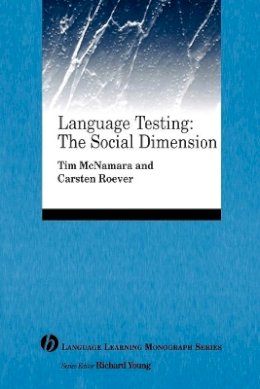
Stock image for illustration purposes only - book cover, edition or condition may vary.
Language Testing: The Social Dimension
Tim McNamara
€ 62.38
FREE Delivery in Ireland
Description for Language Testing: The Social Dimension
Paperback. * An innovative look at the social aspects of language testing, including the assessment of language use in social settings and the societal consequences of language tests. * Considers these issues in relation to language assessment in oral proficiency interviews, and to the assessment of second language pragmatics. Series: Language Learning Monograph. Num Pages: 300 pages, black & white illustrations. BIC Classification: CF. Category: (P) Professional & Vocational. Dimension: 227 x 149 x 17. Weight in Grams: 440.
Winner of the SAGE/ILTA Award for Best Book on Language Testing 2009
This volume focuses on the social aspects of language testing, including assessment of socially situated language use and societal consequences of language tests. The authors argue that traditional approaches to ensuring social fairness in tests go some way to addressing social concerns, but a broader perspective is necessary to examine the functions of tests on a societal scale.
- Considers these issues in relation to language assessment in oral proficiency interviews, and to the assessment of second language pragmatics.
- Argues that traditional approaches to ensuring social fairness in tests go some way to addressing social concerns, but a broader perspective is necessary if we are to fully understand the social dimension of language assessment.
Product Details
Format
Paperback
Publication date
2007
Publisher
John Wiley and Sons Ltd United Kingdom
Number of pages
300
Condition
New
Series
Language Learning Monograph
Number of Pages
320
Place of Publication
Hoboken, United Kingdom
ISBN
9781405155434
SKU
V9781405155434
Shipping Time
Usually ships in 7 to 11 working days
Ref
99-50
About Tim McNamara
Tim McNamara is Professor of Applied Linguistics at The University of Melbourne, where he gained his Ph.D. in Applied Linguistics, and where he helped establish the Language Testing Research Centre, of which he was subsequently Director. His research interests include language testing, language teaching, and language and identity. His recent work has focused on the relevance of contemporary social theory to concerns in language assessment and other areas of applied linguistics, including the role of language tests in the processing of the claims of asylum seekers and in citizenship procedures. He is the author of Language Testing (2000) and has published widely in applied linguistics journals. Carsten Roever is a Lecturer in Applied Linguistics at the University of Melbourne. He has a Ph.D. in Second Language Studies from the University of Hawai‘i at Manoa. His main research interest is the assessment of second language pragmatics. Some of his favorite topics are acquisition of pragmatic knowledge, second language aptitude, web-based language testing, and research design. He has published in Language Testing, Language Learning & Technology, and various edited collections.
Reviews for Language Testing: The Social Dimension
"A major strength of this volume is that it has the potential for opening up a dialog on the social and political consequences of language testing." (Language Teaching, Jan 2009) "This book … offers a unique perspective [and] has enormous potential to assist anyone wishing to broaden their understanding of language testing.” (TESL-EJ.org) "McNamara and Roever have done a fine job, and have produced an important and much needed book." (Journal of Multilingual and Multicultural Development) "McNamara and Roever’s approach to the consequential and social aspects of language testing impressed the awards committee for its originality, breadth of coverage, scholarship, and potential for impact both within and beyond the immediate field of language testing. The authors’ examination of test design and validation compares, contrasts, and evaluates the more traditional ways of conceptualizing the social aspects of language testing with a number of contemporary methods. McNamara and Roever’s ability to connect these methods results in a timely and comprehensive text expected to influence the field for many years to come." (The 2009 Sage/ITLA Award Committee)
